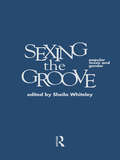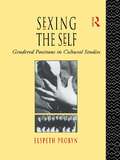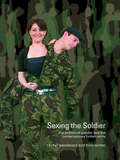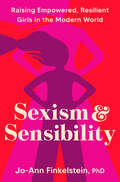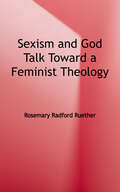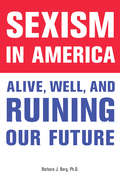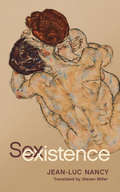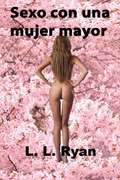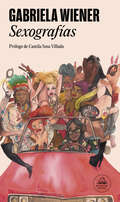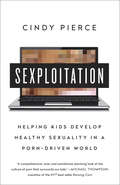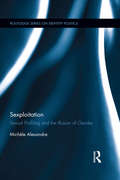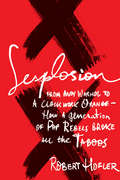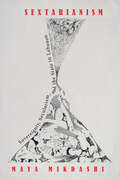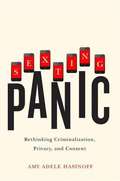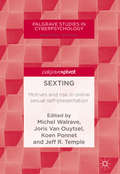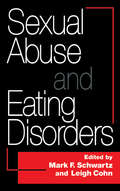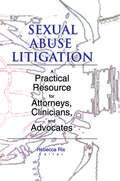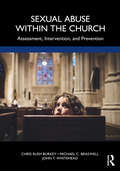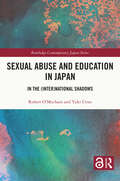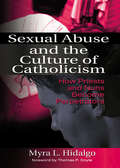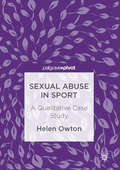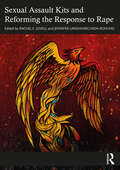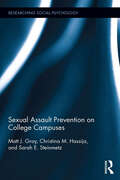- Table View
- List View
Sexing the Groove: Popular Music and Gender
by Sheila WhiteleySexing the Groove discusses these issues and many more, bringing together leading music and cultural theorists to explore the relationships between popular music, gender and sexuality. The contributors, who include Mavis Beayton, Stella Bruzzi, Sara Cohen, Sean Cubitt, Keith Negus and Will Straw, debate how popular music performers, subcultures, fans and texts construct and deconstruct `masculine' and `feminine' identities. Using a wide range of case studies, from Mick Jagger to Riot Grrrls, they demonstrate that there is nothing `natural', permanent or immovable about the regime of sexual difference which governs society and culture.Sexing the Groove also includes a comprehensive annotated bibliography for further reading and research into gender and popular music.
Sexing the Self: Gendered Positions in Cultural Studies
by Elspeth ProbynFaced with the seemingly enormous difficulty of representing `others', many theorists working in Cultural Studies have been turning to themselves as a way of speaking about the personal. In Sexing the Self Elspeth Probyn tackles this question of the sex of the self, an issue of vital importance to feminists and yet neglected by feminist theory until now, to suggest that there are ways of using our gendered selves in order to speak and theorize non-essential but embodied selves. Arguing for `feminisms with attitude', Sexing the Self ranges across a wide range of theoretical strands, drawing upon a body of literature from early Cultural Studies to Anglo-American feminist literary criticism, from `identity debates' to Foucault's `care of the self'.
Sexing the Soldier: The Politics of Gender and the Contemporary British Army (Transformations)
by Rachel Woodward Trish WinterSexing the Soldier takes a critical look at how gender - what it means to be a man or a woman - is understood within the contemporary British Army, and the political and practical consequences of this. Drawing on original research, this informaive volume looks at: the history and structure of the British Army as a masculine institution personnel policies which deal with gender issues the construction of ideas about military masculinities and femininities within the Army media representations of the figure of the soldier. Using case studies ranging from the exclusion of women from direct combat posts, to the issues surrounding bullying, this book argues that we need a fuller, more nuanced assessment of gender issues in the military that moves beyond the simplistic ideas about women's and men's 'natural' capacities for soldiering.
Sexism & Sensibility: Raising Empowered, Resilient Girls in the Modern World
by Jo-Ann FinkelsteinAn invaluable guide to understanding and dismantling sexism for parents trying to raise confident and powerful girls in a culture that often demeans them. &“Seasoned and sensible guidance on the toughest topics in raising girls: misogyny, objectification, body image, confidence, harassment, sexual development, and more.&”—Lisa Damour, PhD, New York Times bestselling author of The Emotional Lives of TeenagersThe world is full of mixed messages for girls: Stand up for yourself but do it softly. Be independent but not single. Love your body, just make sure it&’s waxed, bleached, and thin. And then there are the more overt hostilities: being talked over, paid less, touched without permission, and having politicians debate their right to bodily autonomy. Many parents find it simpler to affirm girls&’ strength than to address these distressing experiences directly. But with girls&’ skyrocketing rates of depression, anxiety, and suicide, parenting them in this culture presents an urgent challenge: How do we teach girls to recognize and cope with these realities without crushing their optimism and belief that they can incite change?Jo-Ann Finkelstein, a Harvard-educated psychologist, has more than two decades of experience working with girls, helping them find resilience in the face of toxic messages about beauty, sex, and femininity. In Sexism & Sensibility, she draws on real stories from her practice to unpack the effects of sexism in its many guises. Going beyond girl power and full of smart, constructive ways to help girls make sense of things, it includes • how to talk about misogyny, gender stereotyping, objectification, and consent—at different ages• strategies for fine-tuning our daughters&’ natural &“sexism detectors&” and safeguarding their self-esteem • ways to help girls spot and contest the microaggressions they face in school, in the media, in relationships, and in public• how to recognize and combat sexism in our own parentingWe can&’t shield our daughters from gender bias and sexism, but we can make sure that they are more prepared to handle it than we ever were. Sexism & Sensibility is an eye-opening and essential resource for proactive parenting.
Sexism and God Talk: Toward a Feminist Theology
by Rosemary Radford RuetherHow did a religion whose founding proponents advocated a shocking disregard of earthly ties come to extol the virtues of the traditional family? <p><p>In this richly textured history of the relationship between Christianity and the family, Rosemary Radford Ruether traces the development of these centerpieces of modern life to reveal the misconceptions at the heart of the family values debate. This edition includes a new introduction.
Sexism in America: Alive, Well, and Ruining Our Future
by Barbara BergDebunking the many myths about how far women have come and the pervasive belief that American society is postfeminist, this account traces women's status and the assault on their rights from the 1950s--when Newsweek declared, "for the American girl, books and babies don't mix"--to the present, exploring the deception behind women's progress and contextualizing the current situation. The legacy of the women's movement is being short-circuited in every aspect of life, as evidenced by statistics such as the growing wage gap between men and women that begins right after college, the U.S. ranking of 31st in world gender equity--behind Latvia and the Philippines--as well as trends ranging from rising medical insurance costs to shortening life expectancy for women. This passionate, extensively documented, humorous, and persuasive argument is simultaneously enlightening, frightening, and revitalizing and helps women understand where they are and why and how they can move beyond marginalizing strategies.
Sexistence
by Jean-Luc NancySex, more than just a part of our experience, troubles our conceptions of existence. Drawing on a fascinating array of sources, ancient and modern, philosophical and literary, Jean-Luc Nancy explores and upholds the form-giving thrust of the drive. Nancy reminds us that we are more comfortable with the drama of prohibitions, ideals, repression, transgression, and destruction, which often hamper thinking about sex and gender, than with the affirmation of an originary trouble at the limits of language that divides being and opens the world.Sexistence develops a new philosophical account of sexuality that resonates with contemporary research on gender and biopolitics. Without attempting to be comprehensive, the book ranges from the ancient world through psychoanalysis to discover the turbulence of the drive at the heart of existence.
Sexo con una mujer mayor
by L-L-RyanMiki era al menos 20 años mayor que yo y no soy pollito de primavera. Tengo nietos Ella fue la criatura más sexual que he conocido. Ella podría tener organismos casi continuos. Su hobby era cultivar plantas eróticas y luego se convirtió en mí.
Sexografías
by Gabriela WienerEdición ampliada de las crónicas sexuales de Gabriela Wiener, un recorrido temerario y trepidante por el lado más salvaje del periodismo narrativo, con prólogo de Camila Sosa Villada. «Gabriela Wiener es una fuerza de la naturaleza y así escribe: un terremoto sobre nuestros tabúes y prejuicios. Este es un libro inteligente y delicioso».María Fernanda Ampuero «Gracias a Belcebú por la mano atrevida de Gabriela Wiener y por su libro, que desorienta a cualquiera que cree sabérselas todas sobre sexo. [...] Este libro es una criatura con sus propios caprichos, que conoce bien el camino al éxtasis, que entristece y desboca como cualquiera de nosotros. Una Wiener que se queda sobre nuestro pecho derramando preguntas mortales como un veneno. La incógnita sobre el sexo, sobre su estrategia para sobrevivir, renovarse y asegurar su perpetuidad. Cuán lejos podemos llegar para sentir algo, qué tan abajo, qué tan arriba y dónde se refugia nuestro placer. A pesar de haber sido escrito durante las últimas dos décadas, Sexografías me hizo pensar en lo necesario que es el sexo para nuestra cultura. Lo tengamos o no, lo deseemos o no. [...] ¿Que si me calenté al leer Sexografías? Sí. ¿Leyendo crónicas periodísticas? Sí. [...] Este libro no pide piedad, pero exige que no mezquinemos cuerpo como lectores. Si la escritora vende así su alma al diablo por la palabra, por qué nosotros no responder con la misma entrega».Del prólogo de Camila Sosa Villada Reseñas:«Gabriela Wiener es un fenómeno de la naturaleza que es un fenómeno de la literatura que es un fenómeno en sentido lato. Una vez, siendo jefa de redacción de un diario español, leí Sexografías y la llamé por teléfono. La llamé un minuto después de cerrar el libro, urgentemente. Cuando la tuve delante, reconocí a la jefa de la tribu. Otra vez leí Sexografías y abandoné el periodismo durante mucho tiempo. Hoy leo Sexografías y confirmo aquellas sospechas: es posible anudar creación, periodismo, compromiso y humor. Ella lo hace aquí. Gabriela Wiener existe».Cristina Fallarás «Gabriela Wiener se pasea por los mundos del sexo como una antropóloga curiosa que visita un planeta de alienígenas: observadora, detallista, divertida, aguda y atinada traductora del disparate de la vida».Rosa Montero «Este libro me cambió la vida y me la vuelve a cambiar cada vez que lo releo. En Sexografías, el sexo es un camino sutil que Wiener toma para armar una voz y dibujar una teoría implícita y profunda sobre el mundo y el sentido de experimentarlo, vivirlo y conquistarlo».Tamara Tenenbaum «Tan deliciosamente escrito como excitante y riguroso: libro de culto para el cuerpo, el deseo, el goce y el fin de los traumas. Leer Sexografías es disfrutar de una escritora exquisita yferoz».Cristian Alarcón «La nueva edición de este clásico contemporáneo multiplica su interés original gracias a la calidad y el jugo de sus renovaciones. Sexografías se nos presenta más ágil y valeroso que nunca».Elisa Victoria
Sexploitation: Helping Kids Develop Healthy Sexuality in a Porn-Driven World
by Cindy PierceAs surprising as it may be to parents, young people today are immersed in porn culture everywhere they look. Through Internet porn, gaming, social media, and advertising, kids today have a much broader view of social and sexual possibilities, which makes it difficult for them to establish appropriate expectations or to feel adequate in their own sexuality. Parents tend to convince themselves that their children are immune to cultural influences, wait until it comes up, or hope schools and pediatricians will address the issues. Educators and doctors may be able to start the conversation but it is fundamentally a parent's job to provide information about sex and relationships early and often to help young people find their way through their social and sexual lives. Delaying the necessary but awkward conversations with their kids leaves them vulnerable. The media, marketers, and porn and gaming industries are eager to step in anywhere parents choose to hold back. Sexploitation exposes the truth to parents, kids, educators, and the medical profession about the seen and unseen influences affecting children, inspiring parents to take the role as the primary sexuality educator. With more information, parents will gain conviction to discuss and develop values, expectations, boundaries, and rules with their kids. Kids who enter their teens with accurate information and truths stand a better chance of developing an "inner compass" when it comes to sex and relationships, which sets them up for a healthy adulthood. In her comic and straightforward style, Pierce brings together the latest research with anecdotal stories shared with her by high school and college students in the thick of it. Above all else, her goal is to get people to develop more comfort around those difficult conversations so that kids gain more confidence and courage about drawing boundaries based on their own values not those put upon them.
Sexploitation: Sexual Profiling and the Illusion of Gender (Routledge Series on Identity Politics)
by Michèle AlexandreMichèle Alexandre’s innovative study examines how sexual profiling represses, oppresses, and hinders various aspects of life for both genders, and explores the ways in which the law and the community can help eradicate the practice of sexual profiling. Alexandre defines "sexploitation" as the perpetuation of myths and stereotypical notions regarding men and women in order to further an agenda of oppression and subordination in certain spheres of society. The most popular means through which this sexploitation is achieved is through a method Alexandre coins as "sexual profiling." She argues that sexual profiling ultimately stifles the growth of our society by creating inefficient as well as oppressive systems, and that its eradication can help increase the productivity as well as the morale of society. Alexandre opens the book by exploring in detail the various ways in which normative views of gender are constructed and perpetuated through media and societal norms. She then focuses on the ways in which recent legal opinions and developments contribute to perpetuate these restrictive and oppressive norms. Finally, Alexandre outlines a plan to help eliminate the presence of these destructive norms and attitudes from different sectors of society.
Sexplosion
by Robert HoflerAfter the sexual revolution came the sexual explosionThe six years between 1968 and 1973 saw more sexual taboos challenged than ever before. Film, literature, and theater simultaneously broke through barriers previously unimagined, giving birth to what we still consider to be the height of sexual expression in our pop culture: Portnoy's Complaint, Myra Breckinridge, Hair, The Boys in the Band, Midnight Cowboy, Last Tango in Paris, and Deep Throat.In Sexplosion, Robert Hofler weaves a lively narrative linking many of the writers, producers, and actors responsible for creating these and other controversial works, placing them within their cultural and social frameworks. During the time the Stonewall Riots were shaking Greenwich Village and Roe v. Wade was making its way to the Supreme Court, a group of daring artists was challenging the status quo and defining the country's concept of sexual liberation. Hofler follows the creation of and reaction to these groundbreaking works, tracing their connections and influences upon one another and the rest of entertainment.Always colorful and often unexpected, Sexplosion is an illuminating account of a generation of sexual provocateurs and the power their works continue to hold decades later.
Sextarianism: Sovereignty, Secularism, and the State in Lebanon
by Maya MikdashiThe Lebanese state is structured through religious freedom and secular power sharing across sectarian groups. Every sect has specific laws that govern kinship matters like marriage or inheritance. Together with criminal and civil laws, these laws regulate and produce political difference. But whether women or men, Muslims or Christians, queer or straight, all people in Lebanon have one thing in common—they are biopolitical subjects forged through bureaucratic, ideological, and legal techniques of the state. With this book, Maya Mikdashi offers a new way to understand state power, theorizing how sex, sexuality, and sect shape and are shaped by law, secularism, and sovereignty. Drawing on court archives, public records, and ethnography of the Court of Cassation, the highest civil court in Lebanon, Mikdashi shows how political difference is entangled with religious, secular, and sexual difference. She presents state power as inevitably contingent, like the practices of everyday life it engenders, focusing on the regulation of religious conversion, the curation of legal archives, state and parastatal violence, and secular activism. Sextarianism locates state power in the experiences, transitions, uprisings, and violence that people in the Middle East continue to live.
Sexting Panic: Rethinking Criminalization, Privacy, and Consent
by Amy Adele HasinoffSexting Panic illustrates that anxieties about technology and teen girls' sexuality distract from critical questions about how to adapt norms of privacy and consent for new media. Though mobile phones can be used to cause harm, Amy Adele Hasinoff notes that the criminalization and abstinence policies meant to curb sexting often fail to account for distinctions between consensual sharing and malicious distribution. Challenging the idea that sexting inevitably victimizes young women, Hasinoff argues for recognizing young people's capacity for choice and encourages rethinking the assumption that everything digital is public. Timely and engaging, Sexting Panic analyzes the debates about sexting while recommending realistic and nuanced responses.
Sexting, Privatsphäre und (Bild-) Rechte im Internet: SPuR - Ein Präventionsprogramm für die 6. und 7. Jahrgangsstufe
by Eva-Maria Schiller Annika Endres Chantal NestlerDieses Fachbuch enthält ein schulklassenbasiertes Durchführungsmanual für Lehrkräfte, Schulsozialarbeiter:innen, Schulpsycholog:innen und weitere an Schulen tätige Trainingskräfte. Das Ziel des SPuR-Präventionsprogramms ist es, frühzeitig einen kompetenten Umgang mit Bildmaterial im Netz zu fördern und der missbräuchlichen Verbreitung von freizügigen Fotos vorzubeugen. Zielgruppe des Programms sind Schüler:innen der 6. und 7. Jahrgangsstufe. In fünf Modulen beschäftigen sich die Schüler:innen mit den Themen Privatsphäre im Internet und dem Austausch von freizügigen Fotos über soziale Medien (sog. Sexting). Was möchte man von sich selbst preisgeben? Welche Gefahren gibt es? Wie kann man sich schützen? Und was kann man tun, wenn ein freizügiges Foto öffentlich geworden ist?Das von Schulpsychologinnen entwickelte, wissenschaftlich fundierte und erprobte SPuR-Präventionsprogramm wird im Buch ausführlich und praktisch erläutert, so dass Sie das medienpädagogische Programm selbstständig an Ihrer Schule durchführen können. Das Buch enthält zudem Hinweise für die Elternarbeit und ergänzende Online-Materialien.
Sexting: Motives And Risk In Online Sexual Self-presentation (Palgrave Studies In Cyberpsychology Ser.)
by Michel Walrave Koen Ponnet Joris Van Ouytsel Jeff R. TempleIn the current debate around sexting, this book gives a nuanced account of motives, contexts and possible risks of intimate digital communication. Authors discuss how social media shape new dating opportunities through apps and dating sites, how sexting fits within individual’s relational and sexual development. They examine the relationships between sexting, health and sexual risk behaviours and focusing on adolescents, further highlight which role parents can play in relational and sexual education.Chapters cover topics such as abusive sexting behaviours in the context of dating violence and slut shaming, media discourses concerning sexting and the legal framework in several countries that shape the context of sexting. This edited collection will be of great interest to academics and students of communication studies, psychology, health sciences and sociology, as well as policy makers and the general public interested in current debates on how social media are used for intimate communication.
Sexual Abuse And Eating Disorders
by Leigh Cohn Mark F. SchwartzFirst published in 1996. Routledge is an imprint of Taylor & Francis, an informa company.
Sexual Abuse Litigation: A Practical Resource for Attorneys, Clinicians, and Advocates
by Rebecca A RixPrepare a solid case with advice from successful litigators!Ideal for use as a legal guide or a practical reference, Sexual Abuse Litigation examines how professionals can responsibly and effectively advocate on behalf of adult survivors of child sexual abuse (CSA) in the midst of the controversies surrounding recovered memories. This comprehensive book places the current recovered-memory controversy in historical context and examines how various psychological and medical conceptions of trauma have shaped public opinion and the construction of delayed discovery statutes of limitations. For lawyers, advocates, clinicians, and CSA survivors, Sexual Abuse Litigation offers practical advice in clear prose and an easy-to-use format. Summaries, charts, legal practice tips, and samples of actual testimony make this book an invaluable reference tool. It also tabulates the statutes of limitations for sexual abuse cases in all fifty states. In Sexual Abuse Litigation, experienced litigators will guide you through the phases of the legal process, offering practical suggestions on: case evaluation and development the pitfalls and opportunities of professional cooperation between therapists and lawyers the effective use of plaintiff expert witnesses strategies for countering the ”false memories” defense the identification of insurance benefits for injuries related to CSA techniques for cross-examining expert witnesses for the defense vital networking information, including resource referrals for adult survivors, help with appellate cases, and information on abuse by clergy and other professionalsOffering strategies for sustaining the admissibility of the CSA survivor's testimony and how to maintain focus on the question of whether abuse occurred, Sexual Abuse Litigation will give you or your client the necessary information on how to successfully prepare for a CSA case and face the challenges of such cases in the courtroom.
Sexual Abuse Within the Church: Assessment, Intervention, and Prevention
by John T. Whitehead Michael C. Braswell Chris Rush BurkeyThis book takes a holistic approach by providing insight into the behavior and nature of sex offenders within the church. The text covers various types of sex offenders as well as their criminal propensities and methods of acquiring victims. Warning signs associated with sex crimes within the church are explained as well as security measures and prevention strategies that church leaders and criminal justice professionals can utilize to minimize risk to congregants. Discussion questions and case study scenarios are provided to allow the reader to examine relevant issues and explore a range of potential solutions and interventions. This comprehensive book is intended for criminal justice academicians who teach courses on sex crimes and sex offenders, criminal justice agents (police and investigators), seminary professors and students, and clergy members. It can also assist security teams, church board members, leaders, and teachers in developing intervention and prevention strategies.
Sexual Abuse and Education in Japan: In the (Inter)National Shadows (Routledge Contemporary Japan Series)
by Robert O'Mochain Yuki UenoBringing together two voices, practice and theory, in a collaboration that emerges from lived experience and structured reflection upon that experience, Ueno and O’Mochain show how entrenched discursive forces exert immense influence in Japanese society and how they might be most effectively challenged. With a psychosocial framework that draws insights from feminism, sociology, international studies, and political psychology, the authors pinpoint the motivations of the nativist right and reflect on the change of conditions that is necessary to end cultures of impunity for perpetrators of sexual abuse in Japan. Evaluating the value of the #MeToo model of activism, the authors offer insights that will encourage victims to come out of the shadows, pursue justice, and help transform Japan’s sense of identity both at home and abroad. Ueno, a female Japanese educator and O’Mochain, a non-Japanese male academic, examine the nature of sexual abuse problems both in educational contexts and in society at large through the use of surveys, interviews, and engagement with an eclectic range of academic literature. They identify the groups within society who offer the least support for women who pursue justice against perpetrators of sexual abuse. They also ask if far-right ideological extremists are fixated with proving that so called “comfort women” are higaisha-buru or “fake victims.” Japan would have much to gain on the international stage were it to fully acknowledge historical crimes of sexual violence, yet it continues to refuse to do so. Ueno and O’Mochain shed light on this puzzling refusal through recourse to the concepts of ‘international status anxiety’ and of ‘male hysteria.’ An insightful read for scholars of Japanese society, especially those concerned by its treatment of women.
Sexual Abuse and the Culture of Catholicism: How Priests and Nuns Become Perpetrators
by Myra L HidalgoAn inside look at the reasons Catholic priests and nuns commit sexual abuseSexual Abuse and the Culture of Catholicism digs beneath the public scandals to explore the underlying causes of sexual abuse by priests and nuns from the unique perspective of an abuse victim/survivor who is an experienced mental health practitioner and social science researcher. This powerful book includes the author’s personal account of sexual abuse by a nun and her years of struggle to recover. Passionate but scholarly and objective, the book advocates the need for healing dialogue, empirical research, and informed prevention strategies to bring a meaningful resolution to the crisis of sexual abuse in the church.Popular explanations for the reasons behind the crisis have included issues related to celibacy, homosexuality, the power structure of the church, and poor seminary screening practices. But none of these theories are supported by research nor can they explain why Catholic priests and nuns may be more likely to abuse children that other adults in positions of trust. Sexual Abuse and the Culture of Catholicism uses a complex, systemic approach to draw parallels between the church as a human system and a family that has experienced incest, presenting a model for a sexual trauma cycle in the church based on systemic sexual shame passed down through the beliefs and practices of Catholicism. Sexual Abuse and the Culture of Catholicism examines: the prevalence and characteristics of sexual abuse by Catholic priests and nuns compared to sex offenders in the general population celibacy, homosexuality, and the power structure of the church as contributing factors in the sexual abuse crisis an analogy of the church as a family in which incest occurs the effects and causes of sexual offending from one generation to the next how current research on sexual offending applies to sexual abuse by priests and nuns healing and empowerment for those affected by religious-based sexual trauma reform and renewal within the Catholic Church and much moreSexual Abuse and the Culture of Catholicism is a unique and important resource for clergy, religious order, and lay leaders in the Catholic Church and other Christian denominations; social science researchers; social workers and mental health professionals; lay and religious members of the Catholic Church; and anyone recovering from religious-based sexual trauma.
Sexual Abuse in Residential Treatment
by Mat Raymond Schimmer Wander BragaSexual Abuse in Residential Treatment provides comprehensive information on behavioral manifestations of sexual abuse in residential settings and the safety and developmental needs, staff training, and management strategies necessary to protect both residents and staff. Chapters containing vivid case studies that describe problematic episodes, discussions of research projects, and proposals for agency sexuality policies, safe facility management, and staff training contribute to a balanced presentation of the framework in which sexual manifestations are embedded.Professionals in residential treatment will learn how to identify the most common sexual, sexualized, and sexually abusive behaviors and from whence they derive. Sexual Abuse in Residential Treatment provides specific suggestions for policy and program design, recommends operational framework for safe management of treatment facilities, and describes practical staff supervision and training modules. With an emphasis on clinical practice, descriptions of common problems and proposed solutions together with a broad philosophical basis to guide policy setting will benefit professionals in agencies interested in developing customized organizational and treatment plans. Practitioners, policymakers, and decision makers in residential programs, inpatient psychiatric units, community-based group homes, court-related youth shelters, and correctional facilities for the rehabilitation of behaviorally disturbed youth presenting sexual problems will find a wealth of information on a wide range of topics such as: normal, pathological, and abusive sexual behavior in residential treatment staff responses to sexual behavior, training, and supervision needs frequency and quality of sexual behaviors of latency-aged children safe management to prevent toxic manifestations of sexuality management of sex abuse allegations in the residential program recommendations for agency sexuality policies selection criteria and program features for specialized offender treatment the heterogeneity of phenomena classified as “sex abuse” values conflicts involved in the design of programs and policiesSexual Abuse in Residential Treatment provides descriptive commentary concerning sexual behavior of youth in residential treatment from various points of view including development, values, therapeutic milieu, safety, training, and clinical experience. Such a diverse approach makes this a valuable guide for practitioners, as well as program directors, unit supervisors, case managers, staff trainers, faculty in child care studies, and child protective services staff.
Sexual Abuse in Sport
by Helen OwtonThis book is about sexual abuse in sport, and specifically about one girl's experience of long-term chronic abuse in sport. A 'non-conventional' approach is employed to explore the experiences of a female athlete named Bella who was groomed, sexually abused by her male coach, and then subjected to years of athlete domestic violence. Through a collaborative auto-ethnography process, these experiences are reported through vignettes and selected poems seeking to involve the reader in the grooming process of a young female athlete, so that they might react from the different social positions they currently occupy. Bella's story acts as a pedagogical resource in ways that stimulate ethical discussions and enhance knowledge of sexual abuse in sport, by assisting those involved to better understand their own 'field' and the dynamics of abuse within it, in order to develop effective abuse prevention strategies.
Sexual Assault Kits and Reforming the Response to Rape
by Rachel E. Lovell Jennifer Langhinrichsen-RohlingSexual Assault Kits and Reforming the Response to Rape curates the current state of untested sexual assault kit research and highlights emerging best practices by exploring the past, the present, and the future of our collective response to rape. This book is the first to address the most critical topics related to untested sexual assault kits and the Department of Justice’s Sexual Assault Kit Initiative, bringing together leading US scholars, practitioners, policy makers, and survivors. In a series of well-researched and thoughtful thematic chapters, the book explores the current state of knowledge related to untested kits, survivors, and perpetrators, while also documenting fundamental and necessary changes in how societal systems respond to rape. It provides an opportunity to learn from our past, highlight what we could do differently now, and envision a better future for victims of rape and those tasked with ensuring justice. It may also serve as a cautionary tale for those jurisdictions that have yet to face their backlog or who have failed to embrace the practice and policy changes that have emerged from the Sexual Assault Kit Initiative. Sexual Assault Kits and Reforming the Response to Rape is essential reading for practitioners (including law enforcement, prosecutors, victim advocates, mental health providers, forensic nurses, and forensic scientists), stakeholders, legislators, and policy makers. It will also be of interest to upper-level students and scholars working on interpersonal violence, gender-based violence, and forensic nursing in social/behavioral science fields.
Sexual Assault Prevention on College Campuses (Researching Social Psychology)
by Matt J. Gray Christina M. Hassija Sarah E. SteinmetzSexual assault continues to be a problem on college campuses despite greater attention to reducing rates of assault and an increased presence in the public discourse. Programming has been historically directed towards women by providing them with information about how to keep themselves safe rather than confronting a climate conducive to sexual violence. This important volume illuminates the urgency of combating sexual violence on college campuses. The authors depict in detail empirically supported approaches to combating climates conducive to sexual violence and ways to empower all members of the campus community to actively prevent sexual violence.
